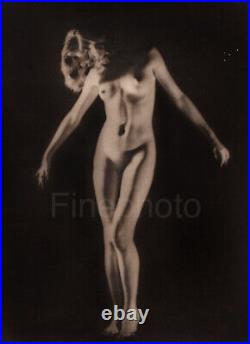1935 Vintage Art Deco FEMALE NUDE Woman By JOHN EVERARD England Photo Gravure


1935 Vintage Art Deco FEMALE NUDE Woman. By JOHN EVERARD England Photo Gravure. Since 1989 - The Name You Can Trust For Fine Vintage Photogravures, Photographs & Antique Prints. Serving the Design & Decor trades for over 20 years. See our vintage and original prints featured in. And other fine quality publications. WE LIST DOZENS OF NEW ARRIVALS EVERY DAY! Where you can search our World Class Selection of authentic vintage prints by photographer or subject. Browse THOUSANDS of fine vintage photography prints from silver gelatin to photogravure. Photographer: John Everard (England) - Renowned English photographer acclaimed for his outstanding art deco style images of the female nude. Female Nude Study - Modernist, Art Deco. Date Of Negative: Circa early 1930's Type Of Print. Authentic Vintage Sheet Fed Photogravure/Héliogravure. Date Of Print: 1935 (86+ years old) Paper: Heavyweight, satin/matte finish Print Origin: England Print/Plate Maker: Vandyck Photogravure Ltd. London, England Approximate Image Size: 11.25 x 9.25 inches Print Border: No - full bleed print Condition Grade: Fine++ Verso: Blan k. Registered Vintage Print Serial #. Certificate Of Authenticity (COA): Yes - individual hand signed COA from Fine Photo Galleries.
This is an authentic, vintage. 1939 Art Deco Photogravure by the renowned British photographer John Everard. Classic art deco design elements are evident in this beautiful nude study by the deco era photographer known for his artistic renderings of the nude. This photogravure is printed on heavy satin/matte finish stock and is blank on the reverse side.
Critically acclaimed throughout his career, John Everard created masterful art deco style photographs of the nude female form during the 1930's and 1940's. A true master of lighting and composition, Everard's nude studies were well known for both technical precision and artistic beauty.
Today his work is sought after by collectors and held in numerous important collections throughout the world. His nudes from the 1930's in any form (silver gelatin or photogravure) have now become particularly scarce. Please note that a computer scan cannot render nor do justice to the beauty, detail and subtle tonality of the actual print.This photogravure is guaranteed to be authentic and comes with a hand signed CERTIFICATE OF AUTHENTICITY (COA) with unique individual registered and certified serial number from the Finephoto Archive & Database. Under magnification this plate shows a tight "honeycomb" grid, excellent pressing of ink and a wide range of tone - all indicative of a high quality sheet fed gravure print. The watermark word "Finephoto" does not appear on the actual print. READY FOR FRAMING & DISPLAY!
- The expensive engraved copper plate photogravure process and the resulting fine prints make vintage photogravures highly collectible and excellent vintage prints for framing and/or display. Secure archival packaging includes water/tear resistant carrier, custom made 275 lb. Triple wall inserts, individual acid free black archival backing boards, individual ultra clear heavy duty archival print protectors and a hand signed Certificate Of Authenticity (COA) from Finephoto. ABOUT PHOTOGRAVURE: Photogravure (also known as Heliogravure) is an intaglio print making process utilizing a carefully etched copper plate made from the original negative/image. Prints are made by pressing suitable paper heavily down upon the inked copper plate which has been intricately etched to varying depths corresponding with the actual tonality of the original negative, This precisely etched plate combined with a fine "honeycomb" screen controls the amount of ink to be transferred to the paper at any given point in direct proportion to the variation of tone in the original image.
The result is a true continuous tone print which combines many qualities of a traditional silver based photograph with a tactile feel similar to an etching, engraving or lithograph. Rich in tonal detail, the photogravure process produces delicately rendered shades for a look which is unique in the world of photographic print making. In the early to mid 1900's photogravure was selected (when budgets allowed) for special high quality publishing and portfolio projects, but due to its significant expense and labor, the process is rarely seen today. From Man Ray and Ruth Bernhard to Brett Weston and Ansel Adams, many of the world's most renowned photographic masters have published their images in the rich photogravure process.
Unauthorized copying or use of ANY PART of this description is prohibited.
